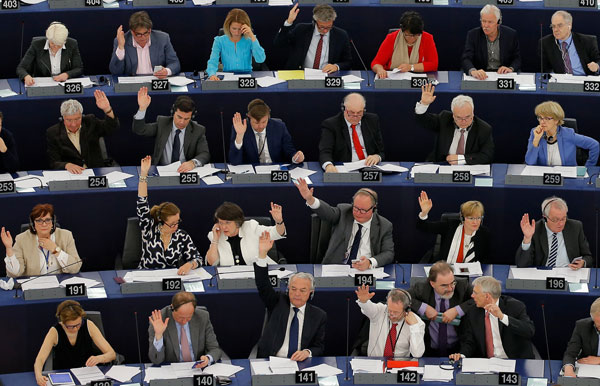China urges EU to honor MES status, despite parliamentary vote
By By Zhong Nan in Beijing and Fu Jing in Brussels (chinadaily.com.cn) Updated: 2016-05-13 21:50 |
|
Members of the European Parliament take part in a voting session in Strasbourg, France, April 12, 2016. [Photo/Agencies] |
Beijing urged Brussels on Friday to honor its commitment of treating China as a market economy even though the European Parliament passed a non-legislative resolution of refusal.
European experts warned European institutions not to be influenced by lobbyists, saying it could result in the China-EU relationship to become embroiled in a tit-for-tat scenario, which "Beijing and sane Europeans" are not willing to see.
The UK, The Netherlands, and Nordic countries support China's market economy status. Germany is, in principle, supportive, but is interested in safeguards for sensitive industries, while Italy is strongly opposed.
China is recognised as a market economy by dozens of non-EU countries such as Brazil, New Zealand, Switzerland, Iceland, Australia and Russia.
An unidentified representative of China's Ministry of Commerce said on Friday that the European Union bloc must observe the accession articles of China's entry of World Trade Organization, which stipulate that China should be automatically given market economy status in December this year after a 15 year transition period.
"In line with Article 15 of the accession protocol signed when China joined the WTO, the Surrogate Country approach used by other WTO members for anti-dumping investigations against China must be dropped by 11th December this year," the representative said.
The Ministry said this international obligation must be shouldered by all WTO members, and European Union is no exception.
On Thursday the European Parliament voted to refuse China MES status, with many members saying that China has not met the five criteria of market economy set by the European institutions.
Beijing maintains granting MES is dependent on international rules, instead of respecting domestic criteria.
Though the resolution is not legally binding, Fredrik Erixon, Director of the Brussels-based European Centre for International Political Economy (ECIPE) said European Parliament was flexing its muscles and is trying to add more clout to the campaign to refuse China MES, to reform anti-dumping policy, and to take emergency action on steel.
"That campaign is waged by member states and business groups and the EP's support now makes it stronger," said Erixon. "Both China and sane people in Europe understand that whatever the result of the MES issue, it should not trigger a tit-for-tat escalation in trade actions against each other."
Luigi Gambardella, president of ChinaEU, a non-profit organization in Brussels promoting bilateral digital and Internet cooperation, said to deny MES to China would be a strong political signal from the EU and may well cause the deterioration of the recent warming political relationship between the two economies.
Gambardella said in the short term, there are concrete risks of retaliation from the Chinese side, causing EU economies serious pain and uncertainty on what will be the end result.
"Closing the door to China may thus have very negative effects," said Gambardella.
The experts from China said Beijing has enough cards at hand but it focuses on constructively deepening bilateral economic and trade relationship.
Lin Guijun, a professor of international trade at the University of International Business and Economics in Beijing, said imposing anti-dumping investigations over European wine, auto parts or vehicles could see China warning the EU that it is not reasonable to persist in trade protectionism, especially under the current global business setting.
The EU has remained China's top trading partner for 12 years, while China has remained the EU's second-largest trading partner for 13 consecutive years.
"For China, having a MES would make it harder for Europe or other economies to impose anti-dumping duties on Chinese goods sold at knock-down prices under the WTO rules, because it would change the method for determining a fair price," said Ma Yu, a senior researcher at the Chinese Academy of International Trade and Economic Cooperation in Beijing.
Ma said that is why the EU is unwilling to offer this status to China as they don't want to see China's foreign trade becoming more flexible with this right under the WTO framework.
The EU began to repeatedly launch defensive trade measures since last year, seeking to impose punitive tariffs against China's various competitive steel products, though such products have helped cut the cost of business in Europe amid economic stagnation.
He Jingtong, a professor of trade at Nankai University in Tianjin, said that in the long-term, China will continue to face frequent trade friction and there is no reason to be optimistic about the prospects in the context of the country's international trade environment and the resurgent protectionism in the world.
"Meanwhile, the recovery path of the global economy is proving to be more complex than anticipated. The uncertainties surrounding the economic recoveries in the EU and the US, together with concerns over employment prospects, suggest high risks of trade remedy measures against Chinese exports to protect local employment," He said.
To contact the reporter: fujing@chinadaily.com.cn
- EU lawmakers vote against recognizing China's market economy status
- Nordic countries agree on China's market economy status
- Amid its worrying moves, EU granting China market economy status not a bilateral negotiation
- EU launches public consultation for granting China market economy status
- Europe urged to grant China market economy status







